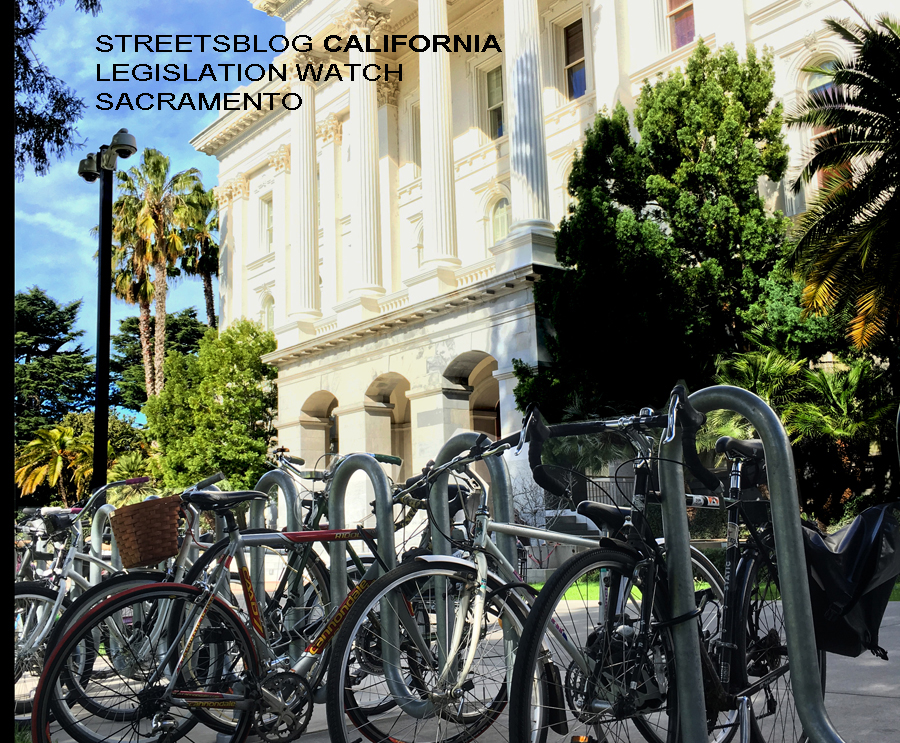Note: GJEL Accident Attorneys regularly sponsors coverage on Streetsblog San Francisco and Streetsblog California. Unless noted in the story, GJEL Accident Attorneys is not consulted for the content or editorial direction of the sponsored content.
Assemblymember Laura Friedman, Chair of the Assembly Transportation Committee, has introduced a "bicycle omnibus bill." Is this the first time the legislature has seen "bicycle" and "omnibus" in the same phrase?
As an "omnibus bill" it addresses a number of different issues related to bicycle law, and they all look pretty good: electric bikes on bike paths, "pedestrian lead intervals" at signals, passing distances, and bicycle licensing.
Currently, local jurisdictions are allowed to prohibit class 1 and 2 e-bikes from bicycle paths and trails, bikeways, bicycle lanes, equestrian trails, and hiking and recreational trails if they so choose. Both of these e-bike types have a pedal-assist function that cuts out once a maximum speed of 20 mph is reached. Class 2 e-bikes also have a throttle which can be used without the pedal assist, but it won't help above 20 mph.
A.B. 1909 would remove local authority to prohibit these speed-limited e-bikes on bike facilities. It would also remove the current statewide prohibition on class 3 e-bikes on bike paths and trails. Class 3 e-bikes don't have a throttle, but do allow riders to use the pedal-assist function to go as fast as 28 mph. The bill would authorize local authorities to prohibit class 3 e-bikes from going faster than 20 mph on bike facilities.
Another provision of the bill would clarify that bike riders are allowed to cross an intersection when a pedestrian signal allows people to cross. That is, where signals include a "pedestrian lead interval" that gives walkers a small head start to begin crossing before cars get a green light, bike riders would now be allowed to cross as well.
As vulnerable road users that benefit from any help they can get, many bike riders already follow this common-sense approach, by which they are able to get out in front of drivers that may not be paying full attention to their presence.
A.B. 1909 also clarifies the "three feet for safety act," which requires motor vehicles to leave a minimum of three feet of space when passing or overtaking bike riders. The bill makes it clear this would mean that the driver is required to move all the way over into an adjacent travel lane to pass, if one is available.
The bill's final provision would prohibit local jurisdictions from requiring riders to register their bikes or obtain a license for them. Bike license requirements still exist on the books in many cities, and it has been used as a pretext to stop and question certain bike riders, especially Black and brown riders. Police sometimes argue that bike registrations is necessary to track stolen bikes - but the nonprofit Bike Index has proven to be a much more efficient way to register and find stolen bikes (register your bike(s) if you haven't already, it's free).
Stop-as-Yield
Assemblymember Tasha Boerner Horvath is back for another try after Newsom vetoed last year's A.B. 122, which would have allowed bike riders to treat stop signs as yield signs, thus not being legally required to stop if there is no other traffic present. The new bill, A.B. 1713, now includes an age limit, so that it would not apply to riders under eighteen years of age. This seems to be in response to Newsom's veto, which asserted - without data - that the bill "may be especially concerning for children, who may not know how to judge vehicle speeds or exercise the necessary caution to yield to traffic when appropriate.”
However, bike advocates are not pleased with the notion of adding an age limit, as it would create confusion and potential for harassment. It's also not clear how it would resolve Newsom's objection to the bill.
Stay tuned for more on these bills as they are heard in committees.






